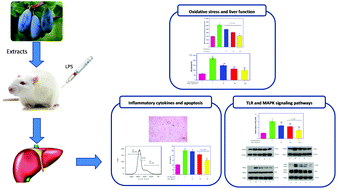The protective effects of Lonicera caerulea berry extract (LCBE) against hepatic inflammation and the underlying mechanisms were investigated in a rat model of lipopolysaccharide (LPS)-induced chronic liver inflammation. Male Sprague–Dawley rats were injected with LPS (200 μg per kg bw) with or without LCBE co-administration (50, 100 and 200 mg per kg bw intragastrically once daily) for 4 weeks. We found that LCBE supplementation inhibited the increase in Toll-like receptor (TLR)2 and TLR4 expression induced by LPS, while preventing glutathione depletion and reactive oxidative species generation and abrogating increases in C-reactive protein and interleukin-6 levels, restoring alanine and aspartate aminotransferase activities, and blocking the phosphorylation of p38 and c-Jun N-terminal kinase mitogen-activated protein kinases (MAPKs). The protective effects of LCBE against liver damage caused by LPS were dose-dependent. These results demonstrate that LCBE suppresses liver inflammation caused by LPS via inhibition of TLR and MAPK signaling and oxidative stress pathways, and suggest that LCBE treatment can potentially prevent chronic liver injury.

